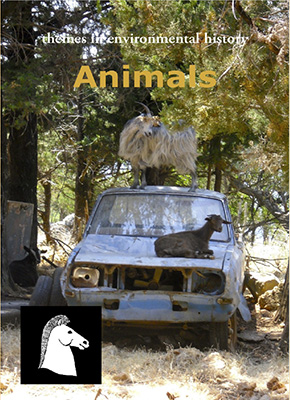Animals
Themes in Environmental History, 4.

Compiled by Sarah Johnson
Comprising essays selected from Environment and History and Environmental Values, these inexpensive paperbacks address important aspects of environmental history through theoretical essays and case studies. The readers are attracting increasing interest from course-organisers. Animals examines human relationships with non-human others, exploring dynamics of exploitation, preservation and cultural interpretation. The essays, whose animal actors range from whales to goats, cormorants to crocodiles, cover such diverse topics as hunting, farming, conservation and display. The authors are alive to the complexities and conflicts inherent in human–animal interactions: as friend, as food, as object of ethical discourse or of power-play between human societies, this volume shows that there is no simple answer to the question posed in the opening essay – ‘An Animal: What is it?’
LOOK INSIDE THIS BOOK at Amazon.co.uk
TABLE OF CONTENTS
Introduction. Sarah Johnson
- An Animal: What is it? Keekok Lee
I. Using animals: populations and exploitation
- Bodies on the Beach: Domesticates and Disasters in the Spanish Philippines 1750–1898. Greg Bankoff
- Goats, Marginality and the ‘Dangerous Other’. David Siddle
- Three Centuries of Whaling and Walrus Hunting in Svalbard and its Impact on the Arctic Ecosystem. Louwrens Hacquebord
- A ‘Sportsman’s Paradise’: The Effects of Hunting on the Avifauna of the Gippsland Lakes. Coral Dow
- Environmental History of Marine Mammal Exploitation in Trinidad and Tobago, W.I., and its Ecological Impact. Aldemaro Romero, Ruth Baker, Joel E. Cresswell, Anuradha Singh, Annabelle McKie and Michael Manna
II. Animal conservation: history and theory
- Conservation and Individual Worth. Gill Aitken
- The Grey Seal in Britain: A Twentieth Century History of a Nature Conservation Success. Robert A. Lambert
- For the ‘Preservation of Friends’ and the ‘Destruction of Enemies’: Studying and Protecting Birds in Late Imperial Russia. Brian Bonhomme
III. Population management: past realities and future strategies
- Wolves in the Early Nineteenth-Century County of Jönköping, Sweden. Örjan Kardell and Anna Dahlström
- De-Domestication: Ethics at the Intersection of Landscape Restoration and Animal Welfare. Christian Gamborg, Bart Gremmen, Stine B. Christiansen and Peter Sandøe
IV. Where culture meets creature
- ‘The Common Cormorant or Shag Lays Eggs Inside a Paper Bag’. A Cultural Ecology of Fish-eating Birds in Western Australia. Joanna Sassoon
- A Cultural History of Crocodiles in the Philippines: Towards a New Peace Pact? Jan van der Ploeg, Merlijn van Weerd and Gerard A. Persoon
- Demonstration Wildlife: Negotiating the Animal Landscape of Vancouver’s Stanley Park, 1888-1996. Sean Kheraj
- Hunting Narratives of the Age of Empire: A Gender Reading of Their Iconography. Karen Wonders
1 March 2014, Paperback, 380pp.
ISBN 978-1-874267-80-5, £20
